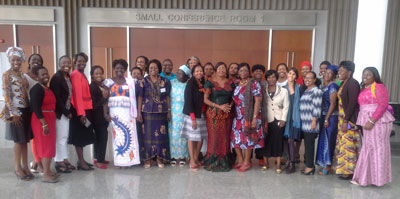Equipping women to become stronger mediators for peace in Africa
A joint workshop for women in Africa hosted by UN Women, the African Union Commission and the Department of International Relations and Cooperation of South Africa seeks to develop a new generation of conflict mediators.Date:
Addis Ababa, Ethiopia –Florence Guliba works actively in South Sudan, organizing forums for civil society, informing citizens about the conflict through radio and other means, and supporting women to ensure that their voices are heard in national peace and reconciliation talks. Through all of this, she has learned that conflict prevention “engaging the women, the communities and the tribes [is key to] better manage the conflicts before they escalate.”
As a programme officer for the South Sudanese Network for Democracy & Elections, an umbrella network of 75 civil society organizations (CSO) in South Sudan, Florence is among the 35 participants from Member States, Regional Economic Communities and CSO representatives, who attended the “Workshop on the Strategic Review of Women's inclusion in on-going mediation processes”.

This gathering is one of the key initiatives of the African Union’s “Year of Women’s Empowerment and Development towards Africa’s Agenda 2063,” to address women’s underrepresentation, work on the strategic inclusion and development of a new generation of women mediators in Africa, and to develop a repository of core women experts in conflict resolution and peace processes to be deployed in the continent.
The workshop was hosted in Addis Ababa, Ethiopia by UN Women, the African Union Commission, the Department of International Relations and Cooperation of South Africa from 29 May to 6 June 2015.
“Gender equality and women’s empowerment are now widely recognized as critical to conflict resolution and peacebuilding efforts, and remarkable achievements have been made at the normative level,”stated Letty Chiwara,UN Women Representative to Ethiopia, the Africa Union and the United Nations Economic Commission for Africa, while noting that women continue to be underrepresented at formal peace talks and peace negotiations. “We have seven Security Council resolutions, numerous action plans, regional frameworks and agreements. Yet, the implementation of these commitments still suffers from uneven results.”
When Lydia Indrianjafy, representing the Foreign Ministry of Madagascar, recalled her previous mediator training: “With military and police officers, the most common solution to a conflict was always to send troops, [whereas] in this training, I have not heard that solution even once! Instead, we have emphasized the importance of impartial negotiations and how to engage the communities.”
Echoing Ms. Indrianjafy’s thought, Ms. Guliba highlights the need “not to limit conflict analysis to the conflicting parties only but to also include affected individuals and communities to the peace negotiations, we are more likely to find durable solutions”.
This workshop also comes while celebrating the 15th anniversary of the United Nations Security Council resolution 1325, the UN’s leading document addressing women’s representation at all decision-making levels in the realm of conflict resolution.
“Our goal is to come out of this year with a strong roadmap for women, peace and security, and to make the case for women’s participation as core to the UN system’s operational effectiveness in all its peace and security efforts,” stated Ms. Chiwara.